Aboriginal History Journal
Aboriginal History is an annual journal that contains interdisciplinary historical studies of Aboriginal and Torres Strait Islander peoples’ interactions with non-Indigenous peoples. It promotes publication of Indigenous oral traditions, biographies, languages, archival and bibliographic guides, previously unpublished manuscript accounts, critiques of current events, and research and reviews in the fields of anthropology, archaeology, sociology, linguistics, demography, law, geography and cultural, political and economic history. The journal has been in publication since 1977.
The journal is co-published by Aboriginal History Inc., a publishing organisation based in the Australian Centre for Indigenous History, Research School of Social Sciences, The Australian National University, Canberra.
For more information on Aboriginal History Inc., please visit aboriginalhistory.org.au. Aboriginal History journal is committed to the highest standards of ethics in academic research and publishing. We are particularly mindful of the specific ethical practices for undertaking research and publishing in relation to Australian Indigenous peoples.
Ownership and management
Aboriginal History Inc. is a publishing organisation based in the Australian Centre for Indigenous History, Research School of Social Sciences, The Australian National University, Canberra. It is governed by an Editorial Board, which meets three times a year. The Corporation also holds an annual general meeting.
The Board is responsible for all journal publishing and business decisions. The Board considers and ratifies all manuscript proposals submitted by the editorial team for the journal.
Aboriginal History journal has an editorial team of four who are responsible for the day-to-day editorial work: a senior and associate editor for journal articles and a senior and associate editor for book reviews.
Aboriginal History journal is co-published by ANU Press and Aboriginal History Inc. Co-published publications are also subject to the ANU Press Publishing Ethics and Publishing Malpractice statement.
Publishing schedule
Aboriginal History is published once a year, in December. Special issues may also be published either within or outside the normal publication schedule of the journal.
Access
Fully open-access scholarly publication is made freely available immediately upon publication. Authors are required to agree with this open-access policy, which enables unrestricted access and reuse of all published papers, with appropriate acknowledgement and citation.
Users are allowed to copy and redistribute the material in printed or electronic format and build upon the material, without further permission or fees being required, provided that appropriate credit is given. The copyright page of the journal will have further information on the specific copyright conditions of particular publications.
Copyright and licensing
Aboriginal History Inc. retains copyright over all published journals and the Aboriginal History Inc. logo.
ANU Press retains copyright over all journal layouts and cover designs that have been created by ANU Press. Where ANU Press has not created this content, this is indicated on the copyright page of the publication. ANU Press also retains copyright of all ANU Press logos and the ANU Press webpages.
Authors retain copyright over their papers, unless otherwise agreed or stated.
Creators of visual and other materials retain copyright over these materials, including photographs, maps, artworks, graphics, video, audio or any other material that might be included in an online publication.
Permission must be obtained to reuse any content that is not published under a Creative Commons licence or where the use of content is not covered by this licence.
Revenue sources
Occasional grants (e.g. Cultural Fund grants in 2015 and 2017 from the Copyright Agency), Copyright Agency remittances for use of copyright material, and remittances from RMIT and ANU Press for sales of Aboriginal History Inc. publications.
Author fees
There are no fees charged to authors for publishing work in Aboriginal History journal.
Peer review process
Aboriginal History journal manuscripts are peer-reviewed by experts and academics in the fields or disciplines relevant to the subject matter of the manuscript being reviewed. A rigorous double-blind peer-review process is used for all articles.
The peer-review process is fair, objective and transparent. Where there is a potential conflict of interest, peer reviewers are expected to remove themselves from the commission. (See Peer reviewer responsibilities and Conflicts of interest below.)
Respect of Indigenous Moral Rights and Intellectual Property
Aboriginal History journal has pioneered interdisciplinary historical studies of Aboriginal and Torres Strait Islander peoples’ interactions with non-Indigenous peoples, principally in Australia but also transnationally. It has promoted publication of Indigenous oral traditions, biographies, languages, archival and bibliographic guides, previously unpublished manuscript accounts, critiques of current events, and research and reviews in the cognate fields of anthropology, archaeology, sociology, linguistics, demography, law, geography and cultural, political and economic history.
We model our approach to publication on two guidelines developed by the Australian Institute of Aboriginal and Torres Strait Islander Studies:
- Ethical Publishing Guidelines (available at aiatsis.gov.au/aboriginal-studies-press/getting-published/ethical-publishing-guidelines)
- AIATSIS Guidelines for Ethical Research in Australian Indigenous Studies (available at aiatsis.gov.au/research/ethical-research/guidelines-ethical-research-australian-indigenous-studies)
Aboriginal History journal takes very seriously any allegations of improper research conduct or infringement of the copyrights and moral rights of Indigenous people.
Plagiarism and academic misconduct
Aboriginal History journal takes any allegations of academic misconduct concerning any submitted manuscripts or published papers seriously.
Reviewers or Board members are expected to report any suspected case of misconduct or plagiarism in a submitted manuscript to the publication editor or Editorial Board with sufficient information and evidence in order for an investigation to be initiated. Where plagiarism or misconduct is identified, Aboriginal History journal will act immediately to suspend publication of the manuscript under question and investigate any allegations until a clarification and successful decision or conclusion is reached.
If a member of the public suspects any case of plagiarism or academic misconduct in any of the articles, book reviews or other content in Aboriginal History journal, we encourage them to notify Aboriginal History Inc. immediately.
Any allegations will be reviewed by the Aboriginal History Inc. Editorial Board. Our investigation will include contacting the author/editor of the suspected manuscript or paper to obtain clarification, setting out the respective complaint or claims made.
Author responsibilities
To publish in Aboriginal History journal, authors must ensure their submitted manuscript meets specific requirements for quality scholarly publications.
The author must warrant that:
- The submitted manuscript is original, has not been published previously and is not being considered for publication elsewhere in either print or electronic form.
- The source of any copyright materials in any submitted manuscripts has been acknowledged, cited or quoted and appropriate permissions to use such copyright material have been obtained.
- The work does not contain any libellous material.
- Any interests, funding or affiliations that may impact on research findings and the impartiality of the submitted manuscripts are disclosed.
- They understand the licence conditions applied to their published papers.
- The submitted manuscripts are in respect of work conducted in an ethical and responsible manner and in compliance with all relevant legislation.
- The submitted manuscripts will report only accurate and reliable data.
Authors must ensure that all persons who have made a significant contribution to the conception, design, execution, or interpretation of the submitted manuscript will be listed as co-authors.
If others have participated in certain substantive aspects of the submitted manuscript, they should be acknowledged or listed as contributors. The corresponding author should ensure that all appropriate co-authors have seen and approved the final version of the submitted manuscripts and have agreed to its submission for publication.
All authors must also disclose in the submitted manuscript all sources of financial support for the project that the submitted manuscript is written about in order to inform the Readers about who has funded research and on the role of the funders in the research.
Peer reviewer responsibilities
Peer reviewers are an essential part of the journal’s scholarly publishing process. They assist the publisher in determining which publications add value to the scholarly debate and ensure the integrity of the scholarly record. Due to the important role played by peer reviewers, it is essential that reviewers conduct reviews in an ethical and accountable manner.
It is the responsibility of the reviewer to:
- Ensure they can return a review in a timely manner.
- Declare any conflict of interest before accepting a manuscript for review.
- Ensure that competing interests are declared to the Editorial Board before accepting a manuscript for review.
- Read the full manuscript and provide feedback on all articles.
- Respect the confidentiality of the peer-review process and not use information obtained during the process for their own or another’s advantage, or to disadvantage or discredit others.
- Not involve anyone else in the review process without first obtaining permission from the Editorial Board.
- Remain unbiased by considerations relating to the nationality, religious or political beliefs, gender or other characteristics of the authors, origins of a manuscript or by commercial considerations.
- Inform the Editorial Board if they find they do not have the necessary expertise to assess the relevant aspects of the manuscript.
- Notify the Editorial Board if they suspect any breach of research or publication ethics immediately.
- Prepare a report for the journal Editor identifying the strengths and weaknesses of the manuscript; providing any advice on revisions, edits, additions or omissions they think are required to improve the manuscript; advise the Editorial Board to accept, revise or reject the manuscript.
Aboriginal History journal employs a rigorous double-blind peer-review model. This model ensures that the authors do not know their reviewers, nor the reviewers the author(s). Authors may suggest potential reviewers to the Aboriginal History Journal Editor, but they are not made aware whether these reviewers were used.
Conflicts of interest
Aboriginal History journal undertakes to remove potential conflicts of interests whether identified before or after publications and expects our editors, authors, editorial board members and reviewers to also be alert to such issues.
Such conflicts may arise from employment, consultancies, stock ownership, affiliations, honoraria, paid expert testimonies, funding arrangements or financial holdings, or grants, patent application/registrations that may raise concerns about potential bias in research findings or editorial decisions.
Potential conflicts of interest should be disclosed at the earliest stage possible. If a potential conflict of interest is identified, the relevant party must declare the interest to the Senior Journal Editor or the Editorial Board and remove themselves from the process while the conflict is investigated. In particular:
JOURNAL EDITORS
Journal Editors will:
- Declare if they have any conflict of interest when receiving a manuscript for consideration.
- Ensure authors and reviewers report potential conflicts of interest that may influence, or be perceived to have influenced, their research findings and conclusions.
- Have in place processes for dealing with submissions from themselves and other members of the Editorial Board.
- Ensure no commercial, advertising or sponsorship arrangements exercise any influence over editorial decisions.
MEMBERS OF EDITORIAL TEAMS/BOARDS
Members of the Editorial Board will declare any conflict of interest before accepting a position on the Board, at the time of submission, declare their interest if they are seeking to publish their own work through Aboriginal History journal.
AUTHORS
Authors will declare any potential conflicts of interest that might be construed to influence the results or interpretation of their submitted manuscript to the Journal Editor when they submit a manuscript.
REVIEWERS
Reviewers will declare any potential conflicts of interest to the Book Review Editor prior to undertaking any review.
Retractions and corrections
In the event an error or a case of academic misconduct is not detected until after publication, a retraction or correction will be issued as soon as practicable.
Authors and other interested parties must promptly report errors or inaccuracies in the officially published version of the journal. The Editor or the Editorial Board will be responsible for adding an erratum to the article or book review. The placement of the erratum will be at the discretion of ANU Press and will be made prominent.
Retractions will be issued in cases of academic misconduct, or in the case of major errors that mean a publication’s findings are not reliable. In this case, the publication metadata will remain on the website with a retraction notice stating the reason for the retraction and its date.
The authors will cooperate with the journal Editor or Editorial Board to retract or correct the published version of the article.
Archiving
Aboriginal History journal is made available to readers in multiple online formats and as print-on-demand hard copies in perpetuity. ANU Press has also partnered with CLOCKSS to digitally preserve its ebooks and ejournals and future-proof access to these publications.
Confidentiality
Editorial staff must not disclose any information about a submitted manuscript to anyone other than the corresponding author, reviewers, potential reviewers, other editorial advisers and Aboriginal History Editorial Board. Editors will ensure that material submitted remains confidential while under review.
Complaints policy
We take seriously complaints or concerns about Aboriginal History journal, our Editorial Board, our Editors, or the activities or information related to Aboriginal History Inc.
All concerns related to errors or suspicion of academic misconduct should be reported in the first instance to the Aboriginal History Inc. Editorial Board which will follow the procedures outlined in this statement.
Authors who have concerns about the editorial or peer-review process are encouraged to discuss these issues with the Aboriginal History Inc. Editorial Board.
Concerns about the legal status of Aboriginal History Inc. publications, such as copyright, privacy or defamation should be submitted to the Editorial Board.
Contact: aboriginal.history@anu.edu.au
Editorial team
- Editor: Crystal McKinnon and Ben Silverstein
- Book Review Editor: Annemarie McLaren
- Copyeditor: Geoff Hunt.
Contact: aboriginal.history@anu.edu.au
Board members
- John Maynard (chair), The Australian National University
- Maria Nugent, The Australian National University
- Lawrence Bamblett, The Australian National University
- Rebecca Collard (Associate Book Review Editor), The Australian National University
- Liz Conor, La Trobe University
- Val Cooms, Griffith University
- Brian Egloff, University of Canberra
- Karen Fox, The Australian National University
- Sam Furphy, The Australian National University
- Niel Gunson, The Australian National University
- Geoff Hunt (copyeditor)
- Julia Hurst, Melbourne University
- Dave Johnston, The Australian National University
- Rani Kerin (Monograph Editor), The Australian National University
- Harold Koch, The Australian National University
- Shino Konishi, University of Western Australia
- Ingereth Macfarlane (Journal Editor), The Australian National University
- Ewan Maidment, The Australian National University
- Isabel McBryde, The Australian National University
- Ann McGrath (Vice-Chair), The Australian National University
- Annemarie McLaren (Reviews Editor), Griffith University
- Rob Paton (Treasurer/Public Officer), The Australian National University
- Peter Read, The Australian National University
- Tikka Wilson (Secretary, Website Manager)
- Laura Rademaker (Associate Monograph Editor), The Australian National University
- Ben Silverstein (Associate Journal Editor), The Australian National University
- Martin Thomas, The Australian National University
Please send article submissions to aboriginal.history@anu.edu.au.
Articles of about 7,000 words in length (including footnotes and references) are preferred, but submissions up to 9,000 words will be considered. Please submit an electronic version of the paper (text only without embedded images or scans) in Microsoft Word or RTF format, along with a short abstract and author biography as a separate document.

Aboriginal History Journal: Volume 48 »
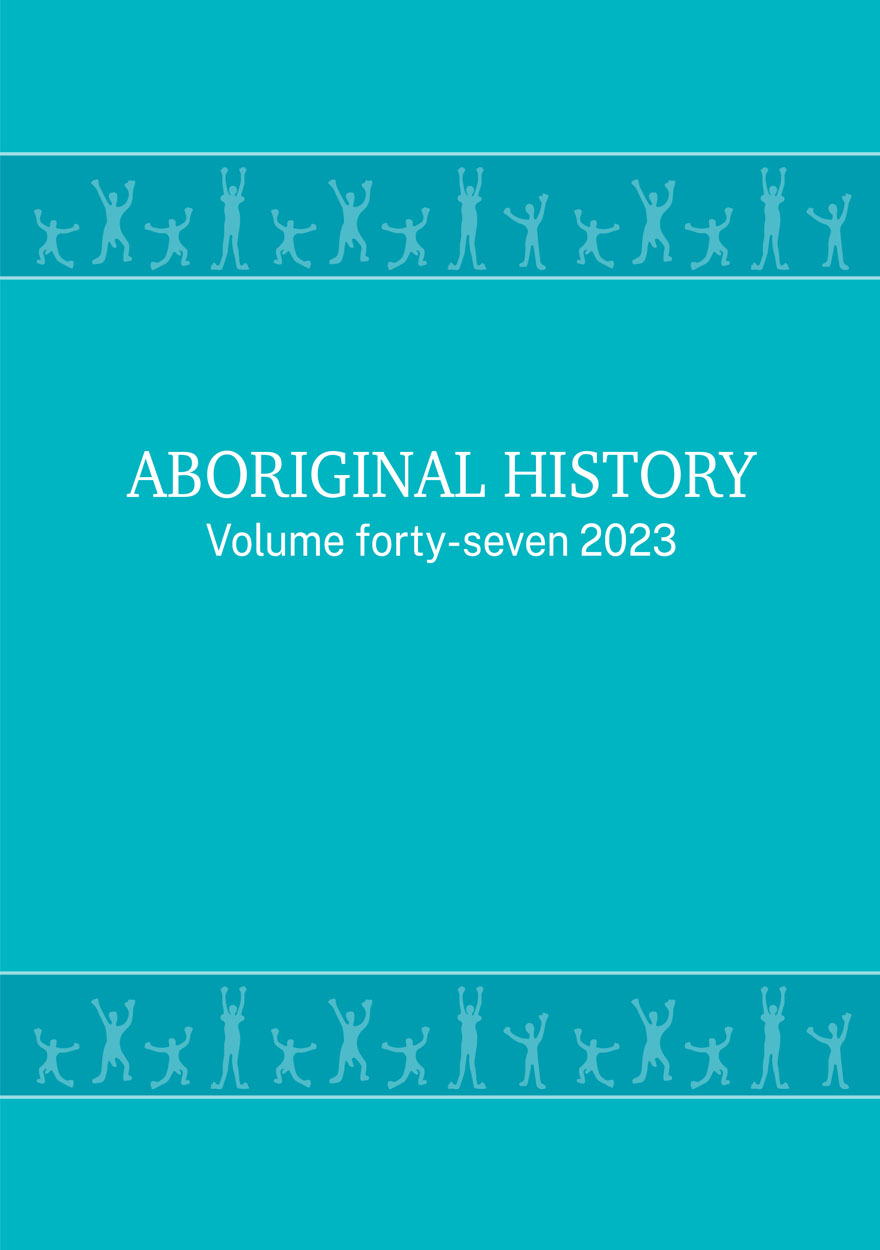
Aboriginal History Journal: Volume 47 »
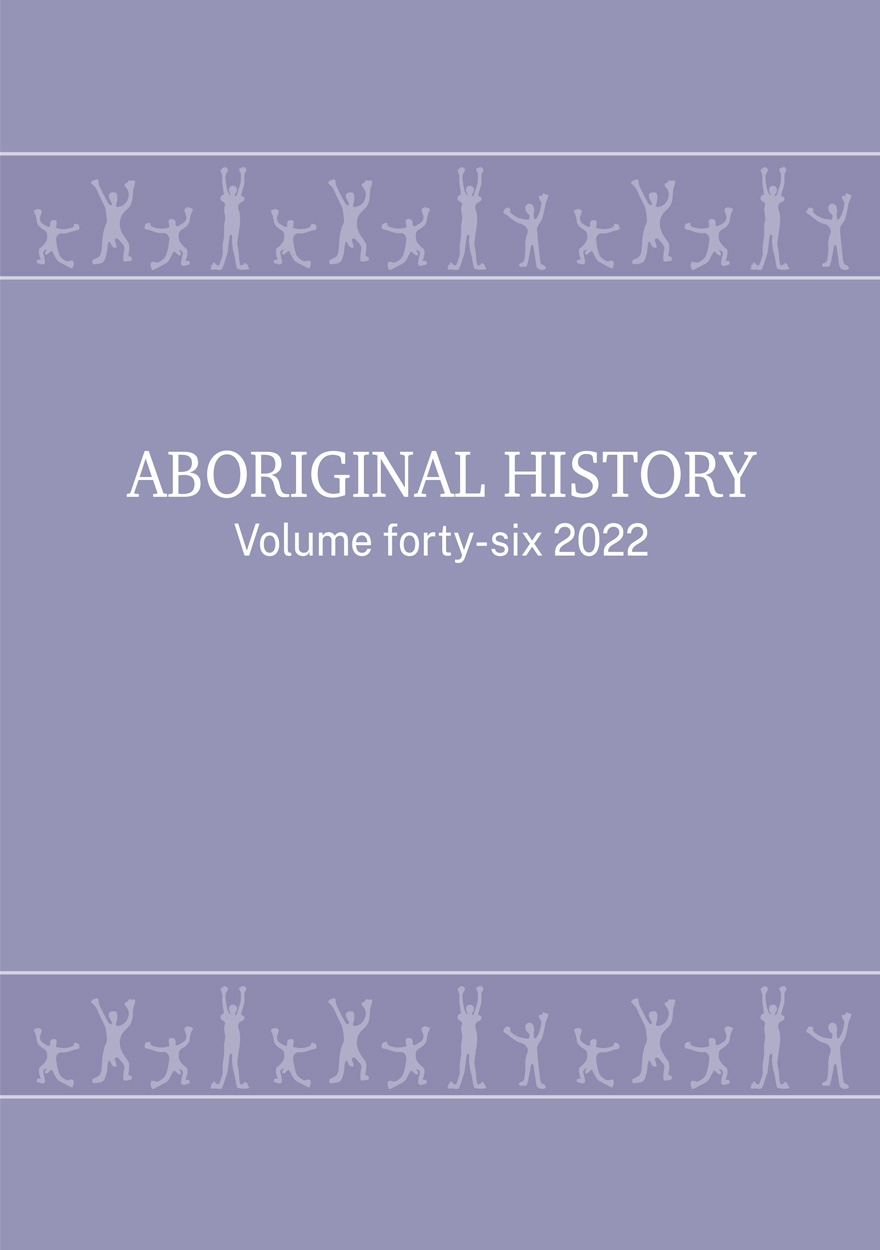
Aboriginal History Journal: Volume 46 »

Aboriginal History Journal: Volume 45 »
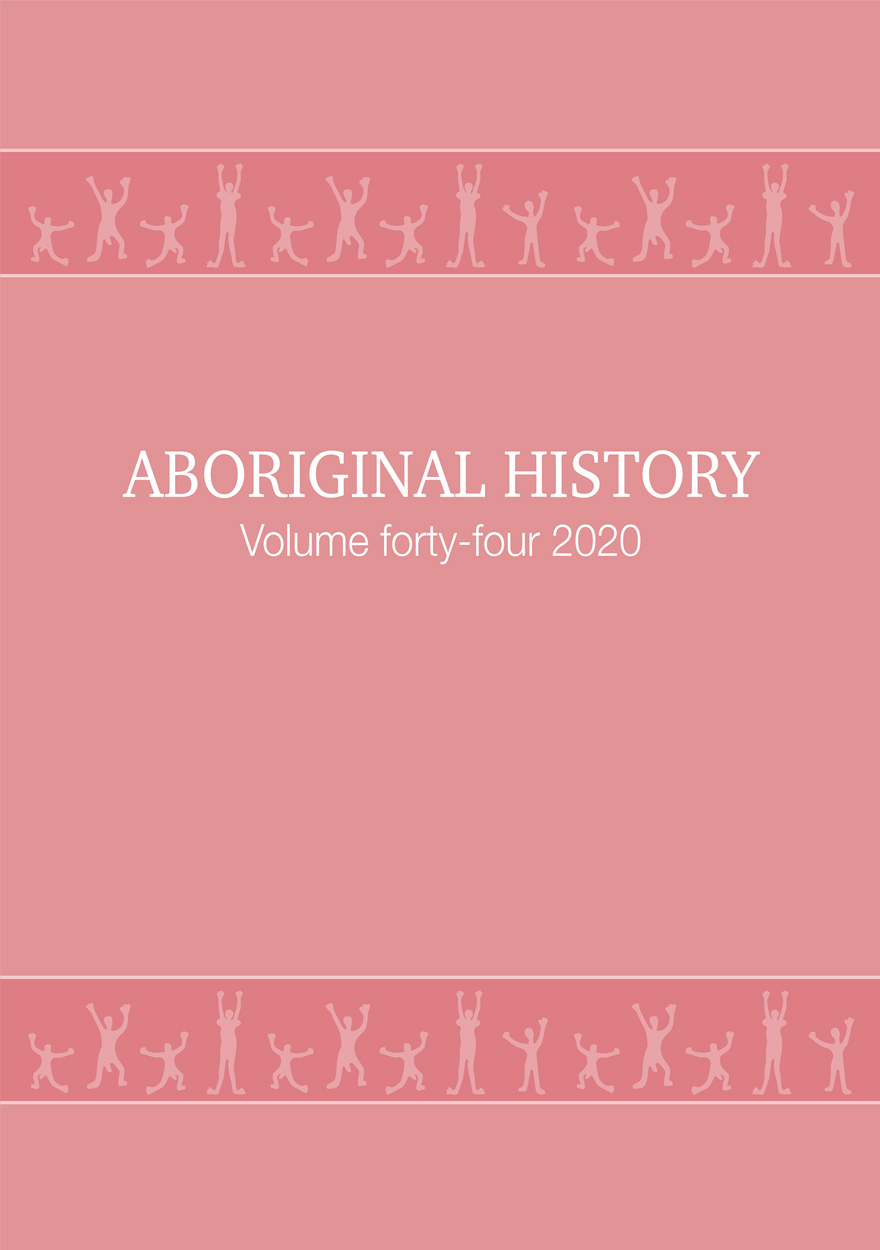
Aboriginal History Journal: Volume 44 »
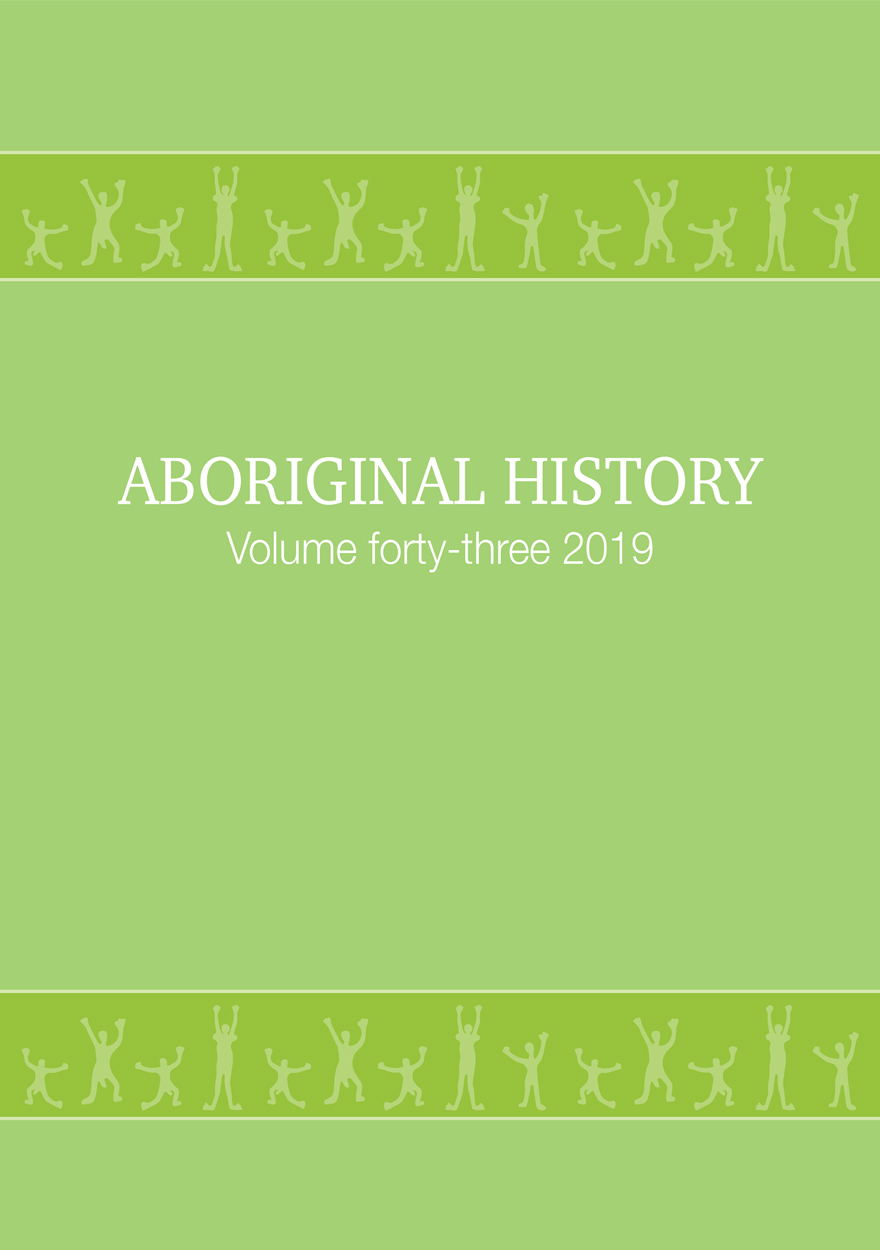
Aboriginal History Journal: Volume 43 »

Aboriginal History Journal: Volume 42 »

Aboriginal History Journal: Volume 41 »

Aboriginal History Journal: Volume 40 »

Aboriginal History Journal: Volume 39 »

Aboriginal History Journal: Volume 38 »

Aboriginal History Journal: Volume 37 »

Aboriginal History Journal: Volume 36 »

Aboriginal History Journal: Volume 35 »
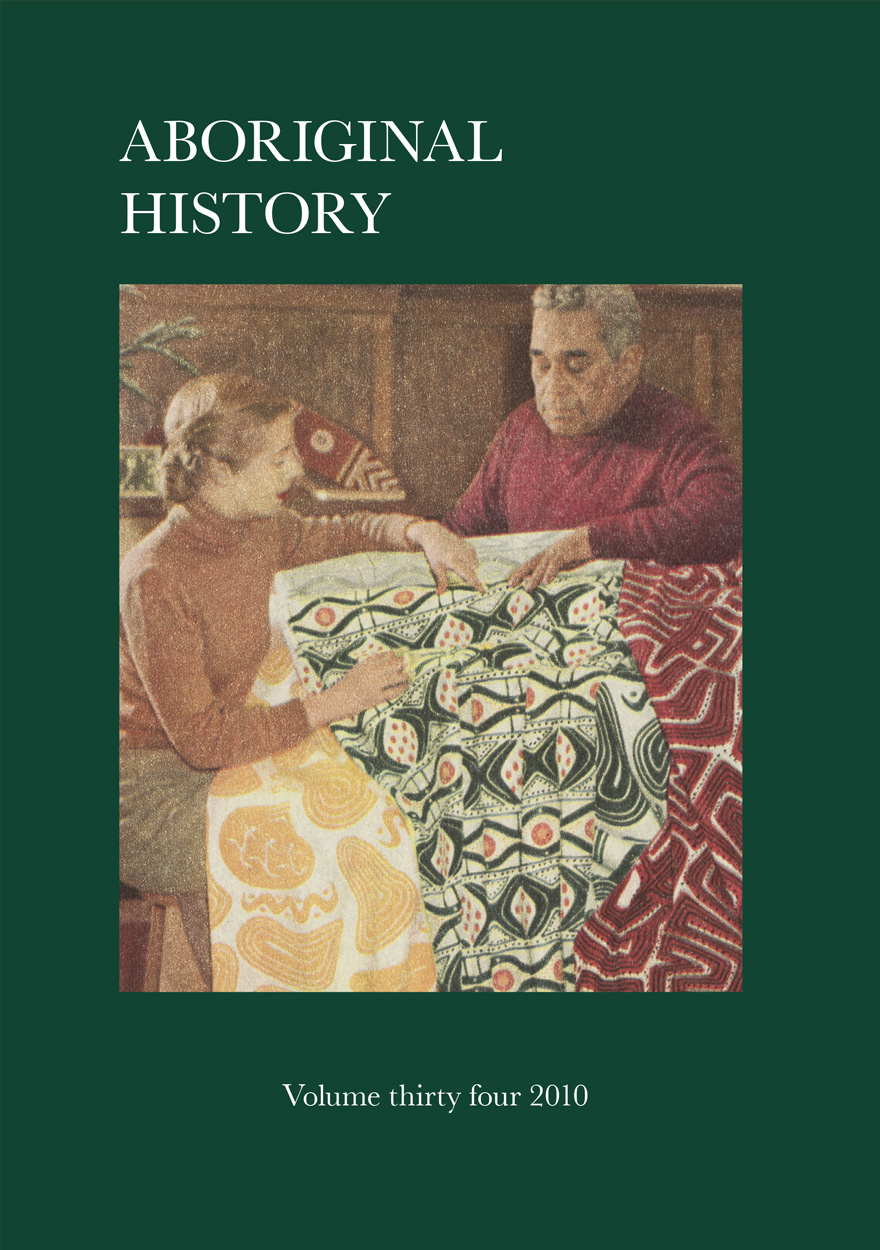
Aboriginal History Journal: Volume 34 »
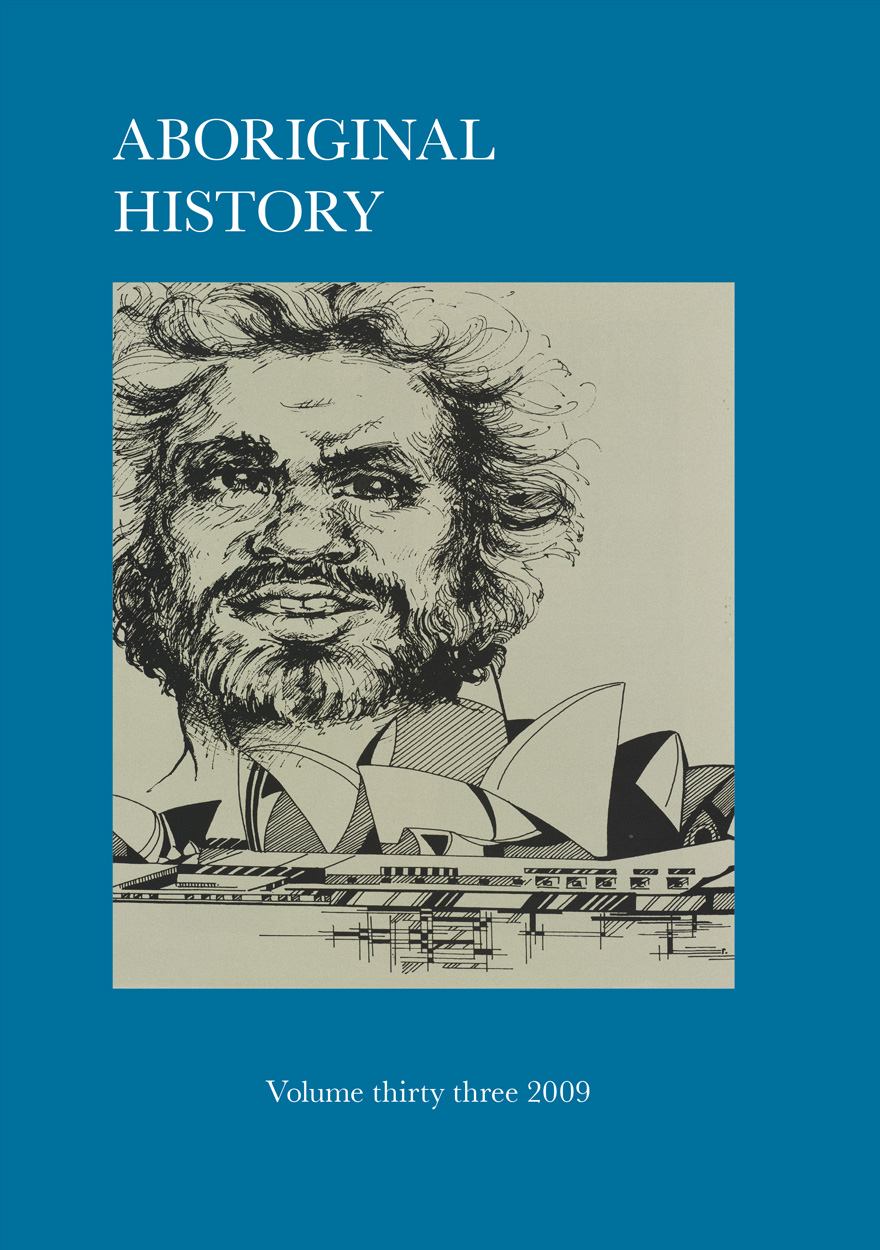
Aboriginal History Journal: Volume 33 »

Aboriginal History Journal: Volume 32 »

Aboriginal History Journal: Volume 31 »

Aboriginal History Journal: Volume 30 »

Aboriginal History Journal: Volume 29 »

Aboriginal History Journal: Volume 28 »

Aboriginal History Journal: Volume 27 »

Aboriginal History Journal: Volume 26 »

Aboriginal History Journal: Volume 25 »




